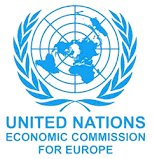
United Nations Economic Commission for Europe
As a multilateral platform that facilitates greater economic integration and cooperation among its fifty-six member States in Europe, North America and Asia, ECE promotes sustainable development and economic prosperity through policy dialogue, negotiation of international legal instruments, development of regulations and norms, exchange and application of best practices as well as economic and technical expertise, and technical cooperation for countries with economies in transition. The ECE Economic Cooperation and Trade Division (ECTD), through ECE’s subsidiary body - the UN/CEFACT - has been working for more than six decades on trade facilitation, defined as "Simplification, harmonization and standardization of procedures and associated information flows required to move goods internationally from buyer to seller and to pass payment in the other direction" with a focus on the standardization of data used in international trade in all UN member States.
During phase 1 and 2, UNECE developed a set of Guidelines and Best Practices for MSMEs in delivering energy efficient products and in providing renewable energy equipment. The study analyses the environment that clean energy MSMEs face as a result of the Covid-19 crisis. It presents examples of best practices in the energy efficiency sector and in the area of renewable energy relevant for MSMEs response to the Covid-19 crisis and post-crisis recovery, as well as case studies on practical measures for MSMEs in getting access to markets, financing, and advanced technologies to MSMEs providing renewable energy equipment. The report also provides Guidelines to MSMEs on access to financing, markets, and advanced technologies and recommendations to Governments for developing policy guidelines and establishing financial incentives schemes.
Based on said report, UNECE developed Customized Guidelines and Best Practices for North Macedonia and Georgia, which contain country-specific conclusions and recommendations. Additionally, online training workshops were organized for the regional study in English and in Russian, and for the two national studies in both countries: North Macedonia and Georgia.
A second set of Guidelines and Best Practices was developed for MSMEs to assure resiliency and progress towards a circular economy in sustainable resource management and critical raw material supply chain solutions. Customized guidelines were developed for Tajikistan and Ukraine, which contain country-specific conclusions and recommendations. An online training workshop was organized for the regional study and two more for the national studies in Tajikistan and Ukraine.
UNECE also launched an online self-paced, free of charge, training course titled “Building Stronger Economies after COVID-19: Standards Implementation for Boosting Micro, Small and Medium Enterprises" (MSMEs) Resilience” The course deconstructs the different aspects of international standards implementation with a view to enabling MSMEs to select and implement those standards, which are relevant to their specialisation, emerging needs in the light of COVID-19 and business development plans. The course illustrates how MSMEs could implement different types of standards within the context of a coherent approach. The course is being translated to several other languages, including Serbian and Russian, and will be delivered in phase 3.
UNECE - SED
Mr. Oleg Dzioubinski
Regional Adviser
Sustainable Energy Division
Email: oleg.dzioubinski@un.org
Partner URL: https://www.unece.org
